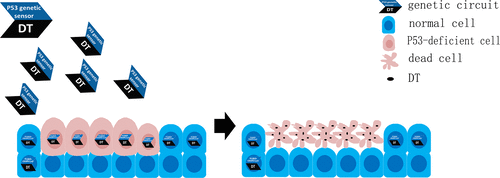当前位置:
X-MOL 学术
›
ACS Synth. Biol.
›
论文详情
Our official English website, www.x-mol.net, welcomes your
feedback! (Note: you will need to create a separate account there.)
Synthesizing a Genetic Sensor Based on CRISPR-Cas9 for Specifically Killing p53-Deficient Cancer Cells
ACS Synthetic Biology ( IF 3.7 ) Pub Date : 2018-06-29 00:00:00 , DOI: 10.1021/acssynbio.8b00202 Hengji Zhan 1 , Haibiao Xie 1 , Qun Zhou 1 , Yuchen Liu 1 , Weiren Huang 1
ACS Synthetic Biology ( IF 3.7 ) Pub Date : 2018-06-29 00:00:00 , DOI: 10.1021/acssynbio.8b00202 Hengji Zhan 1 , Haibiao Xie 1 , Qun Zhou 1 , Yuchen Liu 1 , Weiren Huang 1
Affiliation

|
Cancer is still one of the greatest medical challenges in the world. The p53 protein plays an important role in the process of cancer formation. In addition, p53 is found as the most common mutant gene in cancers. Because of the central role of p53 in oncology, it is necessary to construct effective sensors to detect this protein. However, there are few methods to detect wild type p53 protein (WTP53) or to distinguish the wild type and mutant p53 proteins. In our study, we designed and constructed a p53 genetic sensor that detected the expression of WTP53 in cells. Moreover, we combined the p53 sensor with diphtheria toxin using the CRISPR-Cas9 system to construct a p53 genetic sensor that specifically killed p53-deficient cells such as tumor cells. Our study therefore developed a new way to treat cancers by using an available genetic sensor based on p53 protein.
中文翻译:

合成基于CRISPR-Cas9的遗传传感器以特异性杀死p53缺陷的癌细胞
癌症仍然是世界上最大的医学挑战之一。在P53蛋白在癌症形成过程中起重要作用。另外,发现p53是癌症中最常见的突变基因。由于p53在肿瘤学中的核心作用,因此有必要构建有效的传感器来检测这种蛋白质。但是,很少有检测野生型p53蛋白(WTP53)或区分野生型和突变型p53蛋白的方法。在我们的研究中,我们设计并构建了一个p53基因传感器,该传感器可检测细胞中WTP53的表达。此外,我们结合了p53使用CRISPR-Cas9系统构建具有白喉毒素的传感器,以构建p53遗传传感器,该传感器可特异性杀死p53缺陷型细胞(如肿瘤细胞)。因此,我们的研究开发了一种使用基于p53蛋白的遗传传感器来治疗癌症的新方法。
更新日期:2018-06-29
中文翻译:

合成基于CRISPR-Cas9的遗传传感器以特异性杀死p53缺陷的癌细胞
癌症仍然是世界上最大的医学挑战之一。在P53蛋白在癌症形成过程中起重要作用。另外,发现p53是癌症中最常见的突变基因。由于p53在肿瘤学中的核心作用,因此有必要构建有效的传感器来检测这种蛋白质。但是,很少有检测野生型p53蛋白(WTP53)或区分野生型和突变型p53蛋白的方法。在我们的研究中,我们设计并构建了一个p53基因传感器,该传感器可检测细胞中WTP53的表达。此外,我们结合了p53使用CRISPR-Cas9系统构建具有白喉毒素的传感器,以构建p53遗传传感器,该传感器可特异性杀死p53缺陷型细胞(如肿瘤细胞)。因此,我们的研究开发了一种使用基于p53蛋白的遗传传感器来治疗癌症的新方法。











































 京公网安备 11010802027423号
京公网安备 11010802027423号